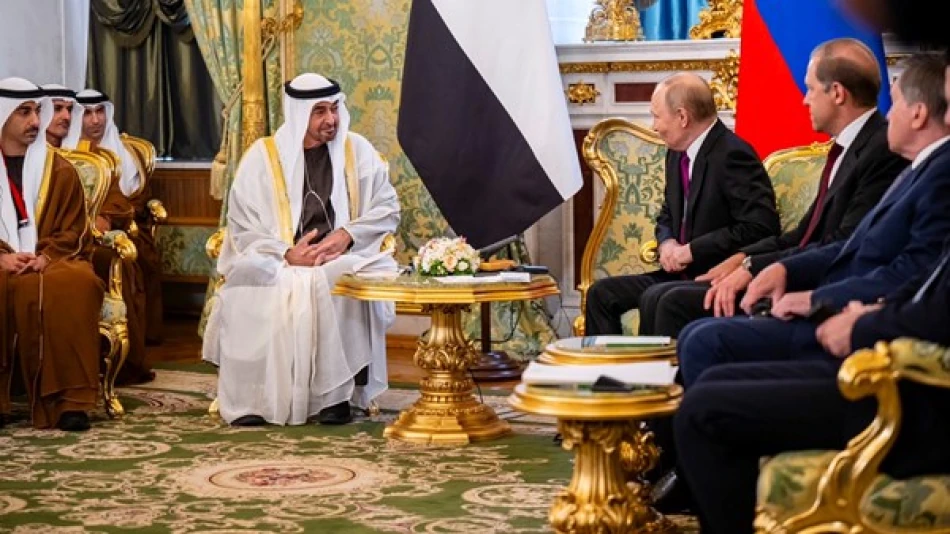
UAE President and Russian Leader Discuss Strengthening Strategic Partnership
UAE and Russia Deepen Strategic Partnership Amid Global Tensions
UAE President Sheikh Mohamed bin Zayed Al Nahyan and Russian President Vladimir Putin have signed key trade and investment agreements during a high-profile Kremlin meeting, strengthening bilateral ties worth billions while positioning the UAE as a crucial mediator in the Russia-Ukraine conflict. The visit underscores the Gulf nation's growing influence as a neutral diplomatic bridge between East and West.
Economic Cooperation Takes Center Stage
The centerpiece of the discussions was the signing of a comprehensive Services Trade and Investment Agreement, marking a significant expansion of the UAE-Russia economic relationship. This bilateral framework complements the existing UAE partnership with the Eurasian Economic Union, which includes Russia, Armenia, Belarus, Kazakhstan, and Kyrgyzstan.
The agreement covers critical sectors including fintech, healthcare, transportation, logistics, and professional services—areas where the UAE has established itself as a regional hub. For Russian businesses facing Western sanctions, the UAE's advanced financial infrastructure and strategic location offer alternative pathways for international commerce.
Infrastructure and Transport Partnerships
A separate memorandum of understanding on land transport cooperation was signed between UAE Energy Minister Suhail Al Mazrouei and Russian Transport Minister Andrey Nikitin, potentially opening new logistics corridors that bypass traditional Western routes.
Diplomatic Mediation Gains International Recognition
President Putin publicly thanked the UAE for facilitating prisoner exchanges between Russia and Ukraine, involving more than 4,000 individuals. This humanitarian diplomacy represents a significant diplomatic achievement for the UAE, demonstrating its ability to maintain relationships with conflicting parties.
The prisoner exchange program mirrors similar mediation efforts by countries like Turkey and Qatar, but the UAE's success rate and scale have positioned it as an increasingly valuable neutral actor in international conflicts. This role enhances the Emirates' soft power and provides leverage in future diplomatic initiatives.
Regional Security and Middle East Focus
Both leaders discussed the upcoming Arab-Russian Summit scheduled for October, initiated by Putin to strengthen Moscow's ties with the Arab world. This timing is particularly significant as Russia seeks to diversify its international partnerships while facing isolation from Western nations.
The leaders emphasized the importance of a two-state solution for Israeli-Palestinian peace, aligning their positions on regional stability. This convergence reflects the UAE's pragmatic approach to balancing relationships with multiple global powers while maintaining its regional influence.
Strategic Implications for Global Markets
The deepening UAE-Russia partnership has substantial implications for international trade flows and investment patterns. The UAE's position as a sanctions-neutral jurisdiction makes it an attractive destination for Russian capital and a potential hub for redirected trade flows.
For investors, this relationship signals the UAE's commitment to maintaining its role as a global business hub regardless of geopolitical tensions. The country's ability to simultaneously host Western businesses while strengthening ties with sanctioned nations demonstrates a sophisticated balancing act that few countries can maintain.
Looking Beyond Traditional Alliances
This visit reflects a broader trend of middle powers asserting independent foreign policies. Similar to Singapore's approach in Asia, the UAE is positioning itself as a neutral facilitator that can engage with all major powers without compromising its core interests.
The five-decade relationship between the UAE and Russia, as emphasized by Sheikh Mohamed, provides a stable foundation for expanded cooperation even as global alliances shift. This long-term perspective allows both nations to pursue mutually beneficial arrangements that transcend current geopolitical tensions.
The formal ceremonies, including military aircraft escorting the UAE president's departure, underscore the high-level importance both nations place on this relationship. Such diplomatic protocol signals to international observers that the UAE-Russia partnership will likely continue expanding regardless of external pressures.
Most Viewed News

 Layla Al Mansoori
Layla Al Mansoori






